Management and Organisations in Global Environment: Opportunities
VerifiedAdded on 2023/06/07
|7
|1572
|325
Essay
AI Summary
This essay explores the impact of globalisation and organisational culture on business organisations, highlighting both opportunities and threats. Globalisation is defined as the integration of cultures, societies, and economies through trade and communication, offering opportunities for market expansion and access to skilled labor. However, it also poses threats such as cultural misunderstandings and the risk of failing to adapt to new markets, as illustrated by Bunnings' unsuccessful expansion into the UK. Organisational culture, defined as the values and beliefs within a company, provides a framework for operations and employee satisfaction, but can also create negative working environments, such as market-driven cultures. The essay concludes that businesses must carefully analyse and adapt to globalisation and cultivate healthy organisational cultures to achieve success, referencing Netflix as an example of a company with a positive organisational culture that values employee efficiency and satisfaction.
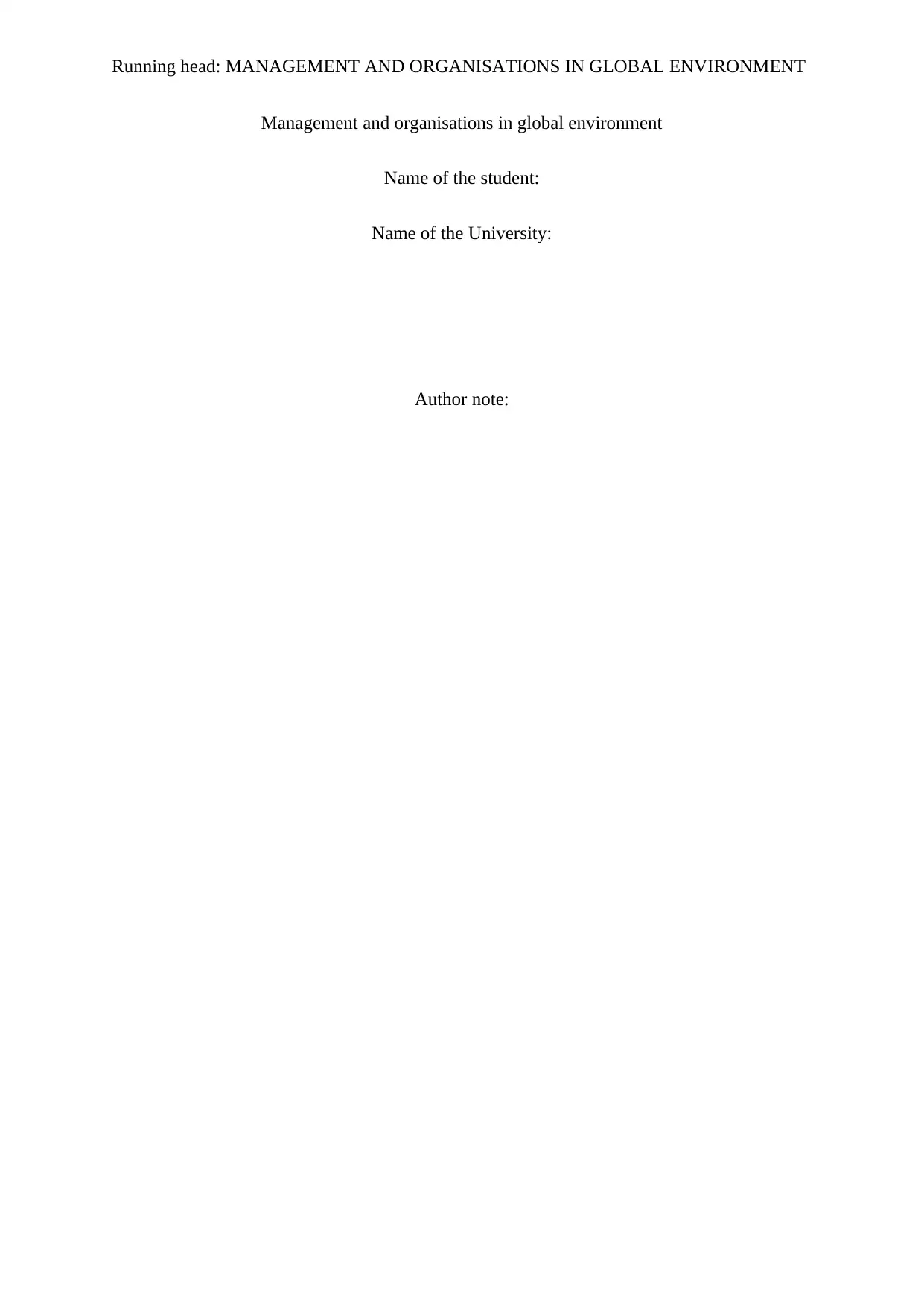
Running head: MANAGEMENT AND ORGANISATIONS IN GLOBAL ENVIRONMENT
Management and organisations in global environment
Name of the student:
Name of the University:
Author note:
Management and organisations in global environment
Name of the student:
Name of the University:
Author note:
Paraphrase This Document
Need a fresh take? Get an instant paraphrase of this document with our AI Paraphraser
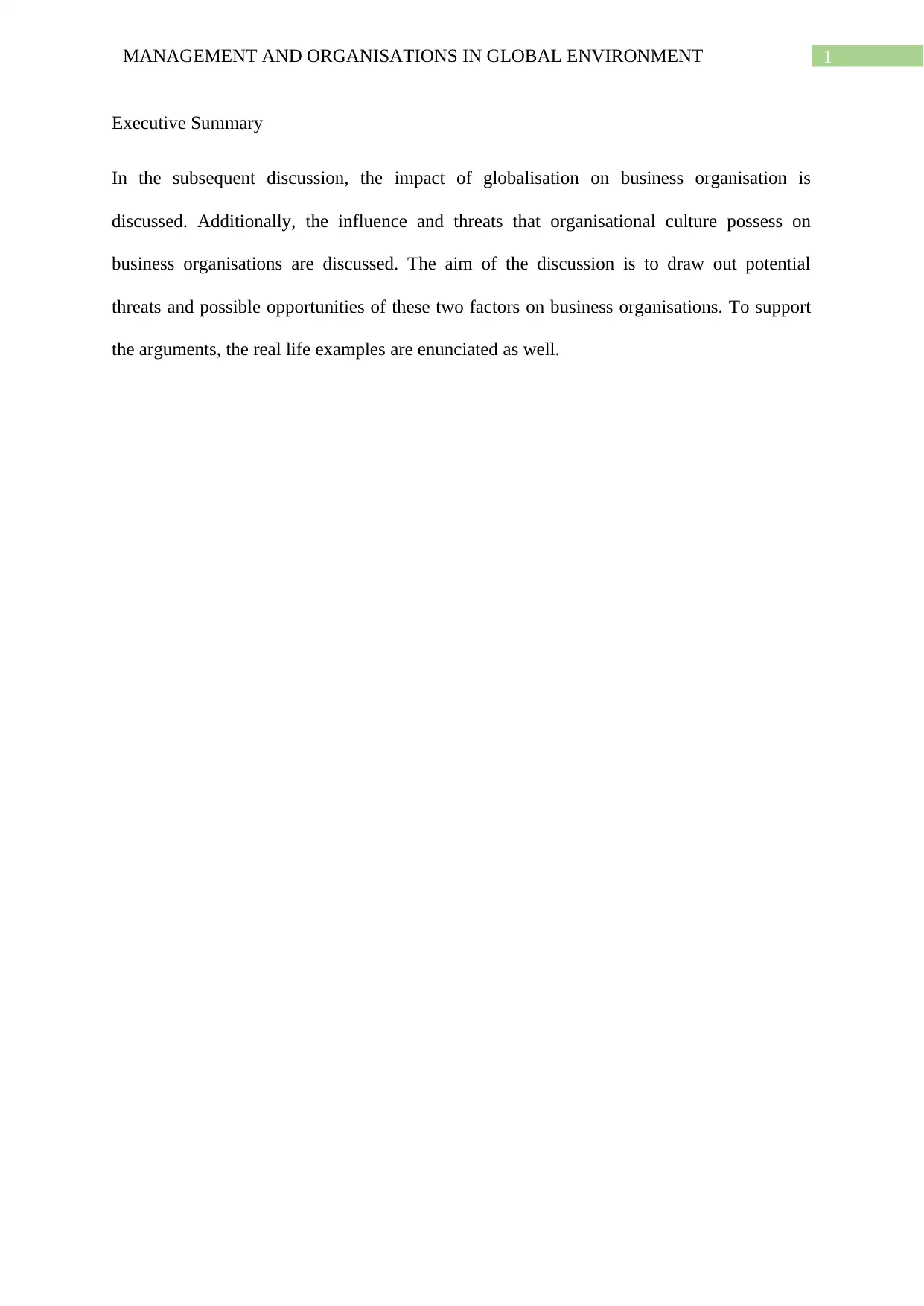
1MANAGEMENT AND ORGANISATIONS IN GLOBAL ENVIRONMENT
Executive Summary
In the subsequent discussion, the impact of globalisation on business organisation is
discussed. Additionally, the influence and threats that organisational culture possess on
business organisations are discussed. The aim of the discussion is to draw out potential
threats and possible opportunities of these two factors on business organisations. To support
the arguments, the real life examples are enunciated as well.
Executive Summary
In the subsequent discussion, the impact of globalisation on business organisation is
discussed. Additionally, the influence and threats that organisational culture possess on
business organisations are discussed. The aim of the discussion is to draw out potential
threats and possible opportunities of these two factors on business organisations. To support
the arguments, the real life examples are enunciated as well.
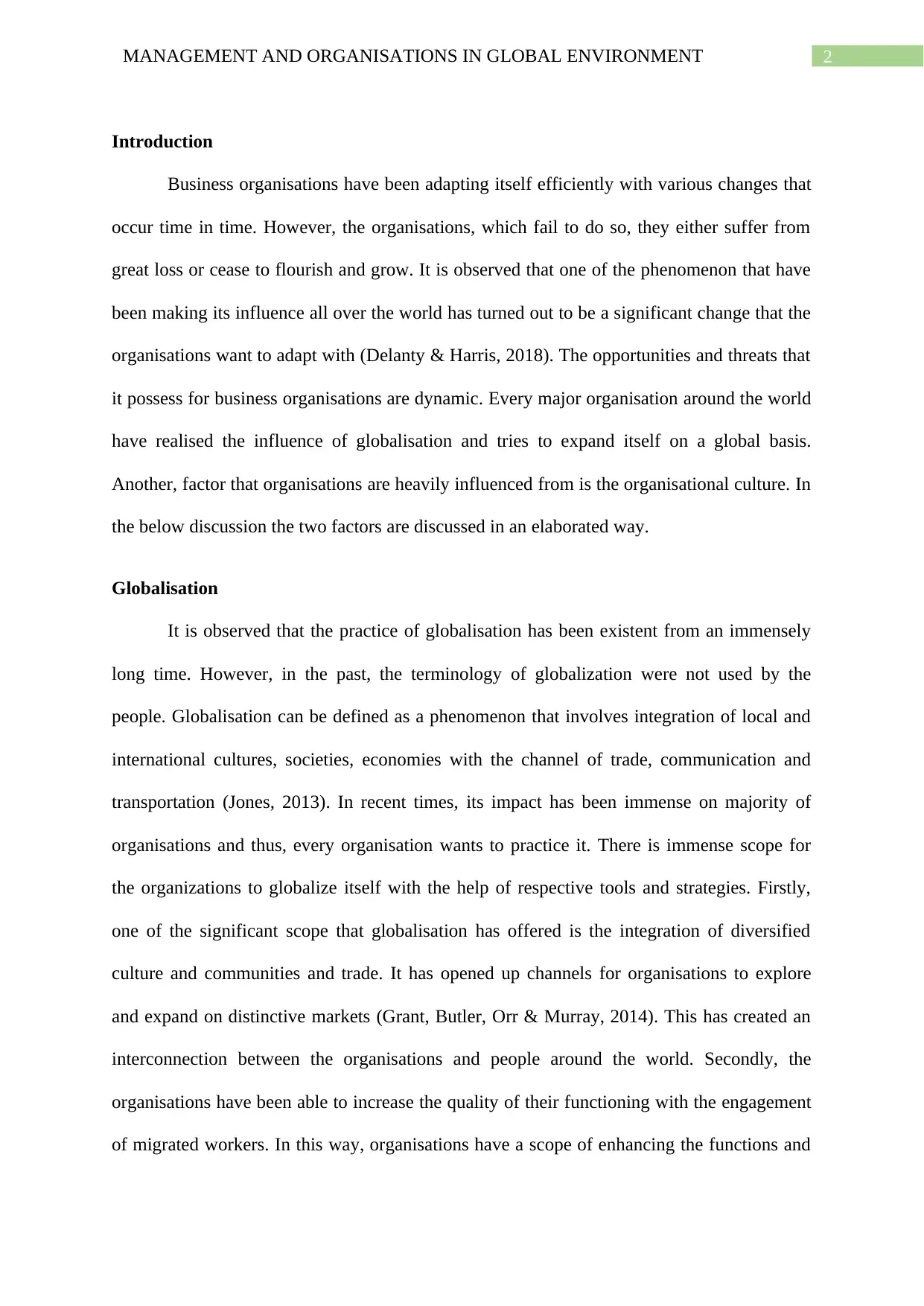
2MANAGEMENT AND ORGANISATIONS IN GLOBAL ENVIRONMENT
Introduction
Business organisations have been adapting itself efficiently with various changes that
occur time in time. However, the organisations, which fail to do so, they either suffer from
great loss or cease to flourish and grow. It is observed that one of the phenomenon that have
been making its influence all over the world has turned out to be a significant change that the
organisations want to adapt with (Delanty & Harris, 2018). The opportunities and threats that
it possess for business organisations are dynamic. Every major organisation around the world
have realised the influence of globalisation and tries to expand itself on a global basis.
Another, factor that organisations are heavily influenced from is the organisational culture. In
the below discussion the two factors are discussed in an elaborated way.
Globalisation
It is observed that the practice of globalisation has been existent from an immensely
long time. However, in the past, the terminology of globalization were not used by the
people. Globalisation can be defined as a phenomenon that involves integration of local and
international cultures, societies, economies with the channel of trade, communication and
transportation (Jones, 2013). In recent times, its impact has been immense on majority of
organisations and thus, every organisation wants to practice it. There is immense scope for
the organizations to globalize itself with the help of respective tools and strategies. Firstly,
one of the significant scope that globalisation has offered is the integration of diversified
culture and communities and trade. It has opened up channels for organisations to explore
and expand on distinctive markets (Grant, Butler, Orr & Murray, 2014). This has created an
interconnection between the organisations and people around the world. Secondly, the
organisations have been able to increase the quality of their functioning with the engagement
of migrated workers. In this way, organisations have a scope of enhancing the functions and
Introduction
Business organisations have been adapting itself efficiently with various changes that
occur time in time. However, the organisations, which fail to do so, they either suffer from
great loss or cease to flourish and grow. It is observed that one of the phenomenon that have
been making its influence all over the world has turned out to be a significant change that the
organisations want to adapt with (Delanty & Harris, 2018). The opportunities and threats that
it possess for business organisations are dynamic. Every major organisation around the world
have realised the influence of globalisation and tries to expand itself on a global basis.
Another, factor that organisations are heavily influenced from is the organisational culture. In
the below discussion the two factors are discussed in an elaborated way.
Globalisation
It is observed that the practice of globalisation has been existent from an immensely
long time. However, in the past, the terminology of globalization were not used by the
people. Globalisation can be defined as a phenomenon that involves integration of local and
international cultures, societies, economies with the channel of trade, communication and
transportation (Jones, 2013). In recent times, its impact has been immense on majority of
organisations and thus, every organisation wants to practice it. There is immense scope for
the organizations to globalize itself with the help of respective tools and strategies. Firstly,
one of the significant scope that globalisation has offered is the integration of diversified
culture and communities and trade. It has opened up channels for organisations to explore
and expand on distinctive markets (Grant, Butler, Orr & Murray, 2014). This has created an
interconnection between the organisations and people around the world. Secondly, the
organisations have been able to increase the quality of their functioning with the engagement
of migrated workers. In this way, organisations have a scope of enhancing the functions and
⊘ This is a preview!⊘
Do you want full access?
Subscribe today to unlock all pages.

Trusted by 1+ million students worldwide
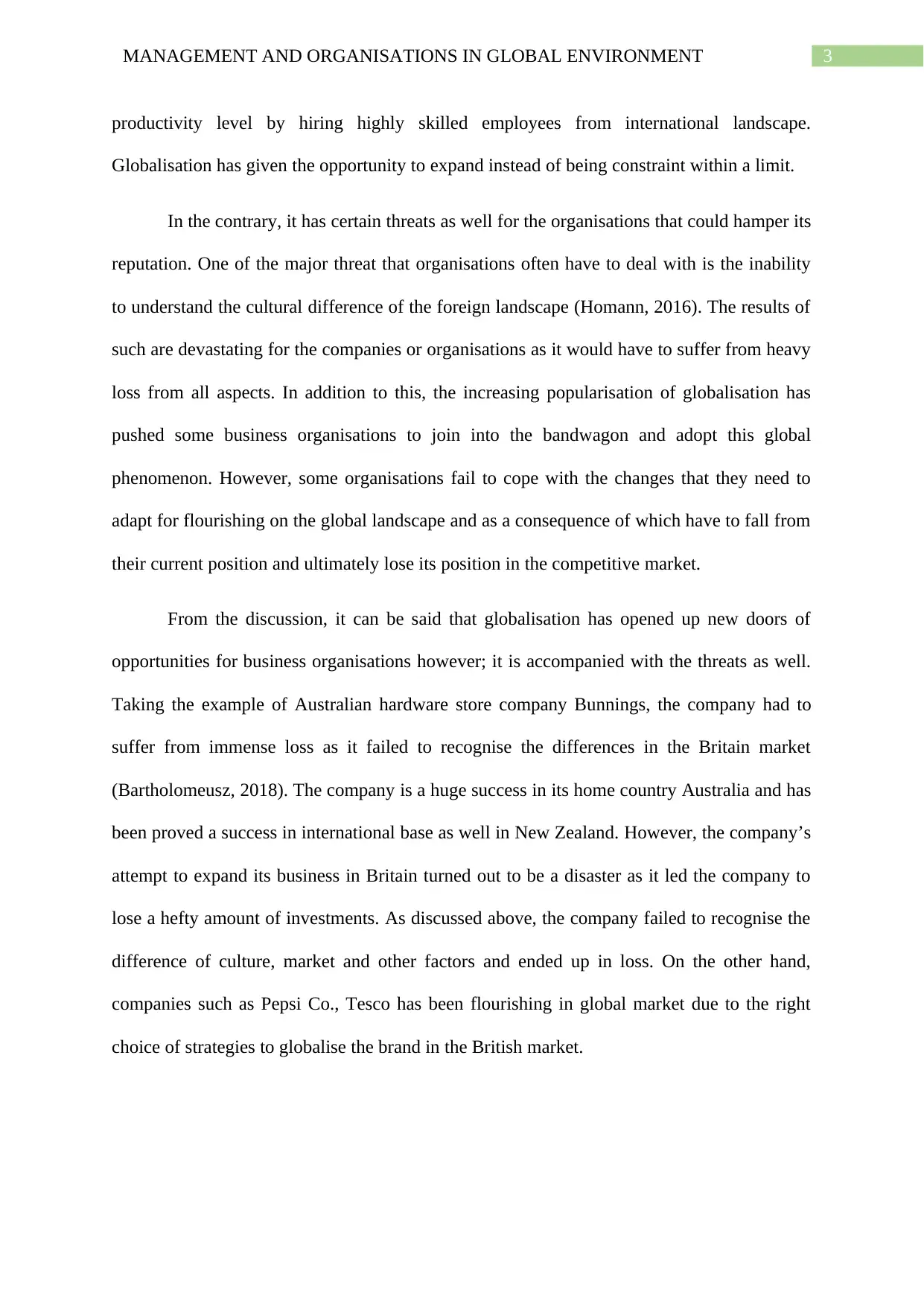
3MANAGEMENT AND ORGANISATIONS IN GLOBAL ENVIRONMENT
productivity level by hiring highly skilled employees from international landscape.
Globalisation has given the opportunity to expand instead of being constraint within a limit.
In the contrary, it has certain threats as well for the organisations that could hamper its
reputation. One of the major threat that organisations often have to deal with is the inability
to understand the cultural difference of the foreign landscape (Homann, 2016). The results of
such are devastating for the companies or organisations as it would have to suffer from heavy
loss from all aspects. In addition to this, the increasing popularisation of globalisation has
pushed some business organisations to join into the bandwagon and adopt this global
phenomenon. However, some organisations fail to cope with the changes that they need to
adapt for flourishing on the global landscape and as a consequence of which have to fall from
their current position and ultimately lose its position in the competitive market.
From the discussion, it can be said that globalisation has opened up new doors of
opportunities for business organisations however; it is accompanied with the threats as well.
Taking the example of Australian hardware store company Bunnings, the company had to
suffer from immense loss as it failed to recognise the differences in the Britain market
(Bartholomeusz, 2018). The company is a huge success in its home country Australia and has
been proved a success in international base as well in New Zealand. However, the company’s
attempt to expand its business in Britain turned out to be a disaster as it led the company to
lose a hefty amount of investments. As discussed above, the company failed to recognise the
difference of culture, market and other factors and ended up in loss. On the other hand,
companies such as Pepsi Co., Tesco has been flourishing in global market due to the right
choice of strategies to globalise the brand in the British market.
productivity level by hiring highly skilled employees from international landscape.
Globalisation has given the opportunity to expand instead of being constraint within a limit.
In the contrary, it has certain threats as well for the organisations that could hamper its
reputation. One of the major threat that organisations often have to deal with is the inability
to understand the cultural difference of the foreign landscape (Homann, 2016). The results of
such are devastating for the companies or organisations as it would have to suffer from heavy
loss from all aspects. In addition to this, the increasing popularisation of globalisation has
pushed some business organisations to join into the bandwagon and adopt this global
phenomenon. However, some organisations fail to cope with the changes that they need to
adapt for flourishing on the global landscape and as a consequence of which have to fall from
their current position and ultimately lose its position in the competitive market.
From the discussion, it can be said that globalisation has opened up new doors of
opportunities for business organisations however; it is accompanied with the threats as well.
Taking the example of Australian hardware store company Bunnings, the company had to
suffer from immense loss as it failed to recognise the differences in the Britain market
(Bartholomeusz, 2018). The company is a huge success in its home country Australia and has
been proved a success in international base as well in New Zealand. However, the company’s
attempt to expand its business in Britain turned out to be a disaster as it led the company to
lose a hefty amount of investments. As discussed above, the company failed to recognise the
difference of culture, market and other factors and ended up in loss. On the other hand,
companies such as Pepsi Co., Tesco has been flourishing in global market due to the right
choice of strategies to globalise the brand in the British market.
Paraphrase This Document
Need a fresh take? Get an instant paraphrase of this document with our AI Paraphraser
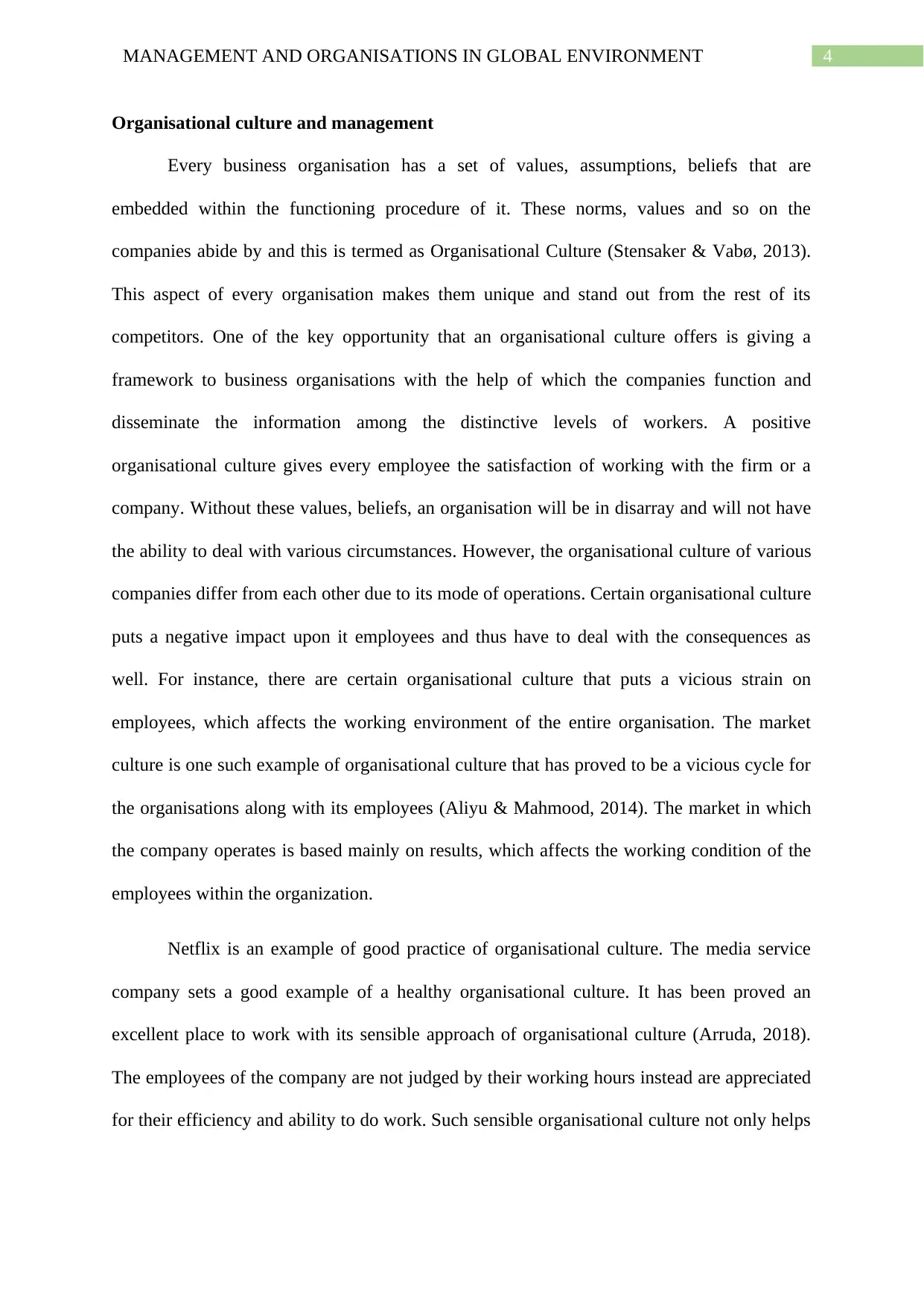
4MANAGEMENT AND ORGANISATIONS IN GLOBAL ENVIRONMENT
Organisational culture and management
Every business organisation has a set of values, assumptions, beliefs that are
embedded within the functioning procedure of it. These norms, values and so on the
companies abide by and this is termed as Organisational Culture (Stensaker & Vabø, 2013).
This aspect of every organisation makes them unique and stand out from the rest of its
competitors. One of the key opportunity that an organisational culture offers is giving a
framework to business organisations with the help of which the companies function and
disseminate the information among the distinctive levels of workers. A positive
organisational culture gives every employee the satisfaction of working with the firm or a
company. Without these values, beliefs, an organisation will be in disarray and will not have
the ability to deal with various circumstances. However, the organisational culture of various
companies differ from each other due to its mode of operations. Certain organisational culture
puts a negative impact upon it employees and thus have to deal with the consequences as
well. For instance, there are certain organisational culture that puts a vicious strain on
employees, which affects the working environment of the entire organisation. The market
culture is one such example of organisational culture that has proved to be a vicious cycle for
the organisations along with its employees (Aliyu & Mahmood, 2014). The market in which
the company operates is based mainly on results, which affects the working condition of the
employees within the organization.
Netflix is an example of good practice of organisational culture. The media service
company sets a good example of a healthy organisational culture. It has been proved an
excellent place to work with its sensible approach of organisational culture (Arruda, 2018).
The employees of the company are not judged by their working hours instead are appreciated
for their efficiency and ability to do work. Such sensible organisational culture not only helps
Organisational culture and management
Every business organisation has a set of values, assumptions, beliefs that are
embedded within the functioning procedure of it. These norms, values and so on the
companies abide by and this is termed as Organisational Culture (Stensaker & Vabø, 2013).
This aspect of every organisation makes them unique and stand out from the rest of its
competitors. One of the key opportunity that an organisational culture offers is giving a
framework to business organisations with the help of which the companies function and
disseminate the information among the distinctive levels of workers. A positive
organisational culture gives every employee the satisfaction of working with the firm or a
company. Without these values, beliefs, an organisation will be in disarray and will not have
the ability to deal with various circumstances. However, the organisational culture of various
companies differ from each other due to its mode of operations. Certain organisational culture
puts a negative impact upon it employees and thus have to deal with the consequences as
well. For instance, there are certain organisational culture that puts a vicious strain on
employees, which affects the working environment of the entire organisation. The market
culture is one such example of organisational culture that has proved to be a vicious cycle for
the organisations along with its employees (Aliyu & Mahmood, 2014). The market in which
the company operates is based mainly on results, which affects the working condition of the
employees within the organization.
Netflix is an example of good practice of organisational culture. The media service
company sets a good example of a healthy organisational culture. It has been proved an
excellent place to work with its sensible approach of organisational culture (Arruda, 2018).
The employees of the company are not judged by their working hours instead are appreciated
for their efficiency and ability to do work. Such sensible organisational culture not only helps
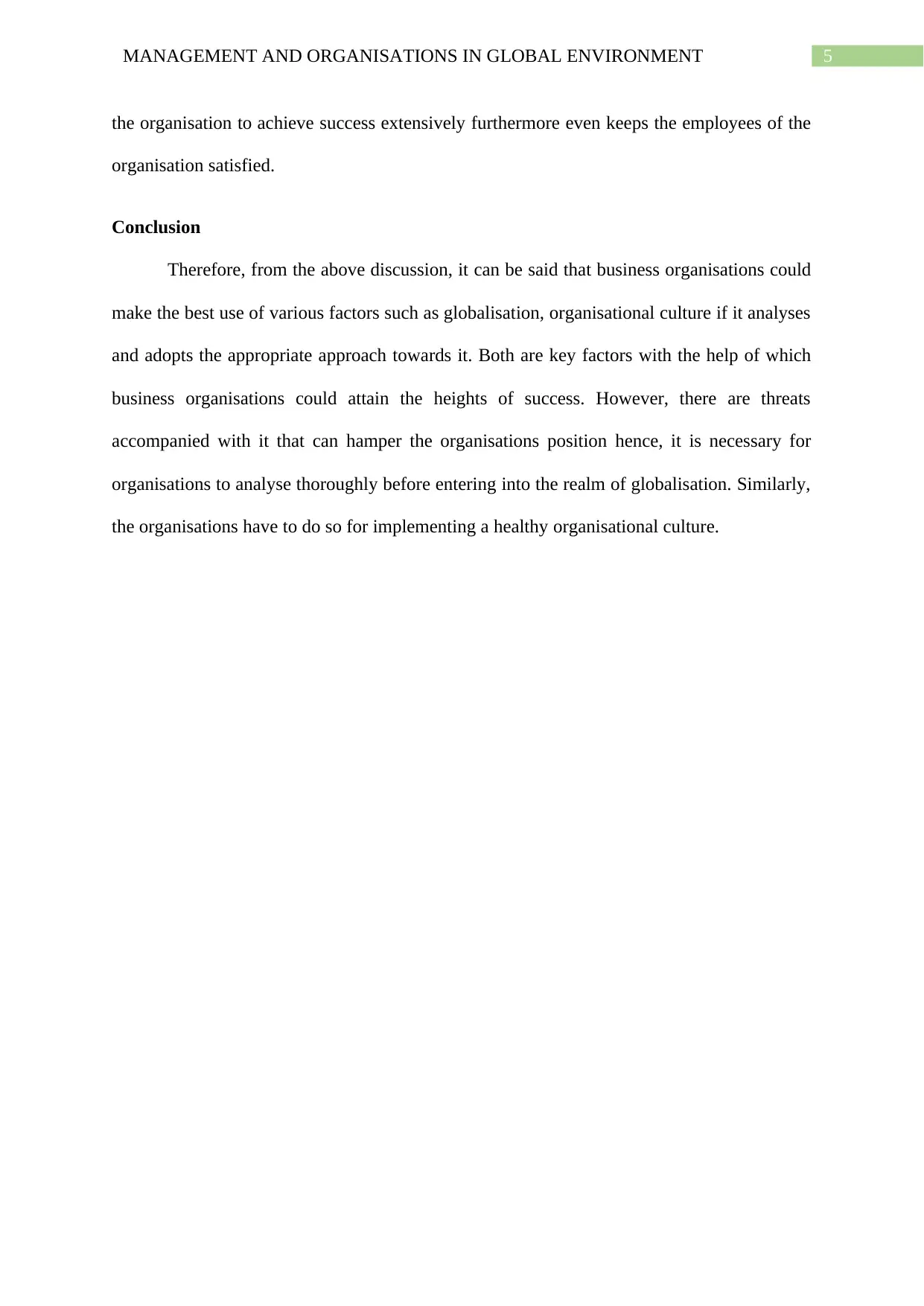
5MANAGEMENT AND ORGANISATIONS IN GLOBAL ENVIRONMENT
the organisation to achieve success extensively furthermore even keeps the employees of the
organisation satisfied.
Conclusion
Therefore, from the above discussion, it can be said that business organisations could
make the best use of various factors such as globalisation, organisational culture if it analyses
and adopts the appropriate approach towards it. Both are key factors with the help of which
business organisations could attain the heights of success. However, there are threats
accompanied with it that can hamper the organisations position hence, it is necessary for
organisations to analyse thoroughly before entering into the realm of globalisation. Similarly,
the organisations have to do so for implementing a healthy organisational culture.
the organisation to achieve success extensively furthermore even keeps the employees of the
organisation satisfied.
Conclusion
Therefore, from the above discussion, it can be said that business organisations could
make the best use of various factors such as globalisation, organisational culture if it analyses
and adopts the appropriate approach towards it. Both are key factors with the help of which
business organisations could attain the heights of success. However, there are threats
accompanied with it that can hamper the organisations position hence, it is necessary for
organisations to analyse thoroughly before entering into the realm of globalisation. Similarly,
the organisations have to do so for implementing a healthy organisational culture.
⊘ This is a preview!⊘
Do you want full access?
Subscribe today to unlock all pages.

Trusted by 1+ million students worldwide
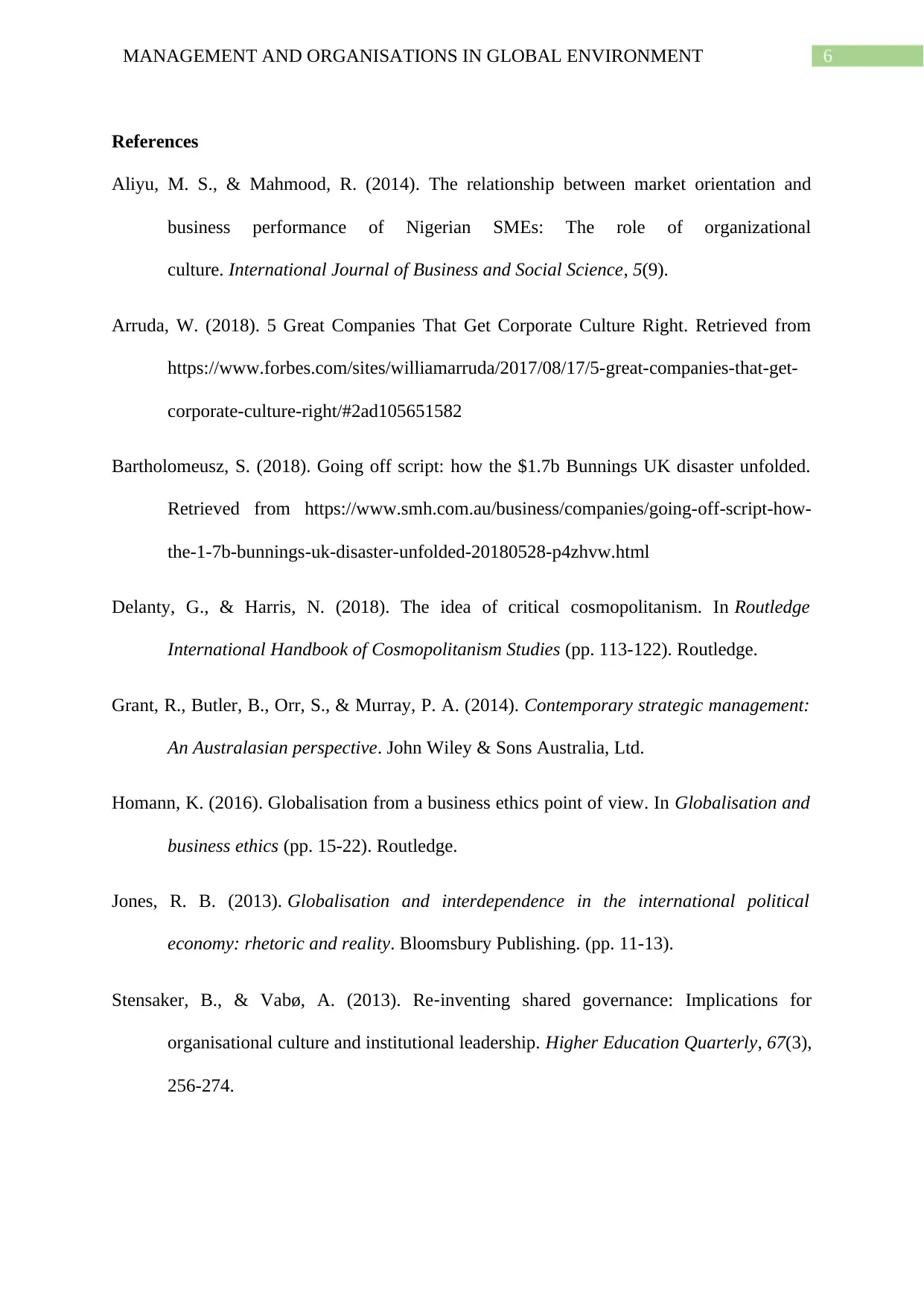
6MANAGEMENT AND ORGANISATIONS IN GLOBAL ENVIRONMENT
References
Aliyu, M. S., & Mahmood, R. (2014). The relationship between market orientation and
business performance of Nigerian SMEs: The role of organizational
culture. International Journal of Business and Social Science, 5(9).
Arruda, W. (2018). 5 Great Companies That Get Corporate Culture Right. Retrieved from
https://www.forbes.com/sites/williamarruda/2017/08/17/5-great-companies-that-get-
corporate-culture-right/#2ad105651582
Bartholomeusz, S. (2018). Going off script: how the $1.7b Bunnings UK disaster unfolded.
Retrieved from https://www.smh.com.au/business/companies/going-off-script-how-
the-1-7b-bunnings-uk-disaster-unfolded-20180528-p4zhvw.html
Delanty, G., & Harris, N. (2018). The idea of critical cosmopolitanism. In Routledge
International Handbook of Cosmopolitanism Studies (pp. 113-122). Routledge.
Grant, R., Butler, B., Orr, S., & Murray, P. A. (2014). Contemporary strategic management:
An Australasian perspective. John Wiley & Sons Australia, Ltd.
Homann, K. (2016). Globalisation from a business ethics point of view. In Globalisation and
business ethics (pp. 15-22). Routledge.
Jones, R. B. (2013). Globalisation and interdependence in the international political
economy: rhetoric and reality. Bloomsbury Publishing. (pp. 11-13).
Stensaker, B., & Vabø, A. (2013). Re‐inventing shared governance: Implications for
organisational culture and institutional leadership. Higher Education Quarterly, 67(3),
256-274.
References
Aliyu, M. S., & Mahmood, R. (2014). The relationship between market orientation and
business performance of Nigerian SMEs: The role of organizational
culture. International Journal of Business and Social Science, 5(9).
Arruda, W. (2018). 5 Great Companies That Get Corporate Culture Right. Retrieved from
https://www.forbes.com/sites/williamarruda/2017/08/17/5-great-companies-that-get-
corporate-culture-right/#2ad105651582
Bartholomeusz, S. (2018). Going off script: how the $1.7b Bunnings UK disaster unfolded.
Retrieved from https://www.smh.com.au/business/companies/going-off-script-how-
the-1-7b-bunnings-uk-disaster-unfolded-20180528-p4zhvw.html
Delanty, G., & Harris, N. (2018). The idea of critical cosmopolitanism. In Routledge
International Handbook of Cosmopolitanism Studies (pp. 113-122). Routledge.
Grant, R., Butler, B., Orr, S., & Murray, P. A. (2014). Contemporary strategic management:
An Australasian perspective. John Wiley & Sons Australia, Ltd.
Homann, K. (2016). Globalisation from a business ethics point of view. In Globalisation and
business ethics (pp. 15-22). Routledge.
Jones, R. B. (2013). Globalisation and interdependence in the international political
economy: rhetoric and reality. Bloomsbury Publishing. (pp. 11-13).
Stensaker, B., & Vabø, A. (2013). Re‐inventing shared governance: Implications for
organisational culture and institutional leadership. Higher Education Quarterly, 67(3),
256-274.
1 out of 7
Related Documents
Your All-in-One AI-Powered Toolkit for Academic Success.
+13062052269
info@desklib.com
Available 24*7 on WhatsApp / Email
![[object Object]](/_next/static/media/star-bottom.7253800d.svg)
Unlock your academic potential
Copyright © 2020–2026 A2Z Services. All Rights Reserved. Developed and managed by ZUCOL.



